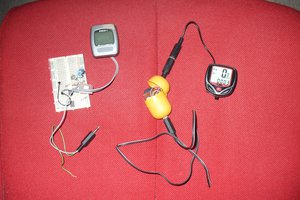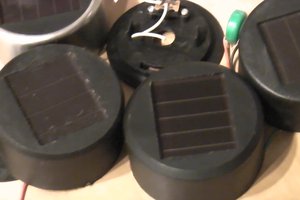#include <avr/sleep.h>
#include <avr/power.h>
#include <avr/wdt.h>
const byte EnableControlPin = 1; //Control Feather Enable Pin
byte saveADCSRA; // variable to save the content of the ADC for later. if needed.
volatile byte counterWD = 0; // Count how many times WDog has fired. Used in the timing of the
// loop to increase the delay before the LED is illuminated. For example,
// if WDog is set to 1 second TimeOut, and the counterWD loop to 10, the delay
// between LED illuminations is increased to 1 x 10 = 10 seconds
void setup ()
{
resetWatchDog (); // do this first in case WDog fires
pinMode ( EnableControlPin, OUTPUT );
digitalWrite ( EnableControlPin, LOW );
// I could put to INPUT between sleep_enable() and interrupts()
// to save more power, then to OUTPUT in the ISR after wdt_disable()
} // end of setup
void loop ()
{
if ( counterWD == 20 ) // if the WDog has fired 10 times......
{
digitalWrite ( EnableControlPin, HIGH); // flash the led on for 100ms
delay (6000); // hate using delay(), but hey! it's only a demo
digitalWrite ( EnableControlPin, LOW);
// delay (6000);
// digitalWrite ( <pre class="hljs cpp" style="margin-top: 5px; margin-bottom: 10px; font-family: Consolas, Menlo, Monaco, "Courier New", monospace; font-size: 16px; word-wrap: normal; overflow-y: auto; padding: 16px 20px; color: rgb(103, 103, 103); line-height: 1.4; border: none !important;">EnableControlPin</pre>, HIGH);
counterWD = 0; // reset the counterWD for another 10 WDog firings
} // end of if counterWD
sleepNow (); // then set up and enter sleep mode
} // end of loop ()
void sleepNow ()
{
set_sleep_mode ( SLEEP_MODE_PWR_DOWN ); // set sleep mode Power Down
saveADCSRA = ADCSRA; // save the state of the ADC. We can either restore it or leave it turned off.
ADCSRA = 0; // turn off the ADC
power_all_disable (); // turn power off to ADC, TIMER 1 and 2, Serial Interface
noInterrupts (); // turn off interrupts as a precaution
resetWatchDog (); // reset the WatchDog before beddy bies
sleep_enable (); // allows the system to be commanded to sleep
interrupts (); // turn on interrupts
sleep_cpu (); // send the system to sleep, night night!
sleep_disable (); // after ISR fires, return to here and disable sleep
power_all_enable (); // turn on power to ADC, TIMER1 and 2, Serial Interface
// ADCSRA = saveADCSRA; // turn on and restore the ADC if needed. Commented out, not needed.
} // end of sleepNow ()
void resetWatchDog ()
{
MCUSR = 0;
WDTCR = bit ( WDCE ) | bit ( WDE ) | bit ( WDIF ); // allow changes, disable reset, clear existing interrupt
WDTCR = bit ( WDIE ) | bit ( WDP2 )| bit ( WDP1 ); // set WDIE ( Interrupt only, no Reset ) and 1 second TimeOut
wdt_reset (); // reset WDog to parameters
} // end of resetWatchDog ()
ISR ( WDT_vect )
{
wdt_disable (); // until next time....
counterWD ++; // increase the WDog firing counter. Used in the loop to time the flash
// interval of the LED. If you only want the WDog to fire within the normal
// presets, say 2 seconds, then comment out this command and also the associated
// commands in the if ( counterWD..... ) loop, except the 2 digitalWrites and the
// delay () commands.
} // end of ISR
0%
0%
Go Green with ATtiny
You can use a low power library or hook up a "TPL5110" to help your project use less power-- But what if a ATtiny85 could help?!

 Daphne
Daphne
 Gerard te Meerman
Gerard te Meerman

 Randy Elwin
Randy Elwin